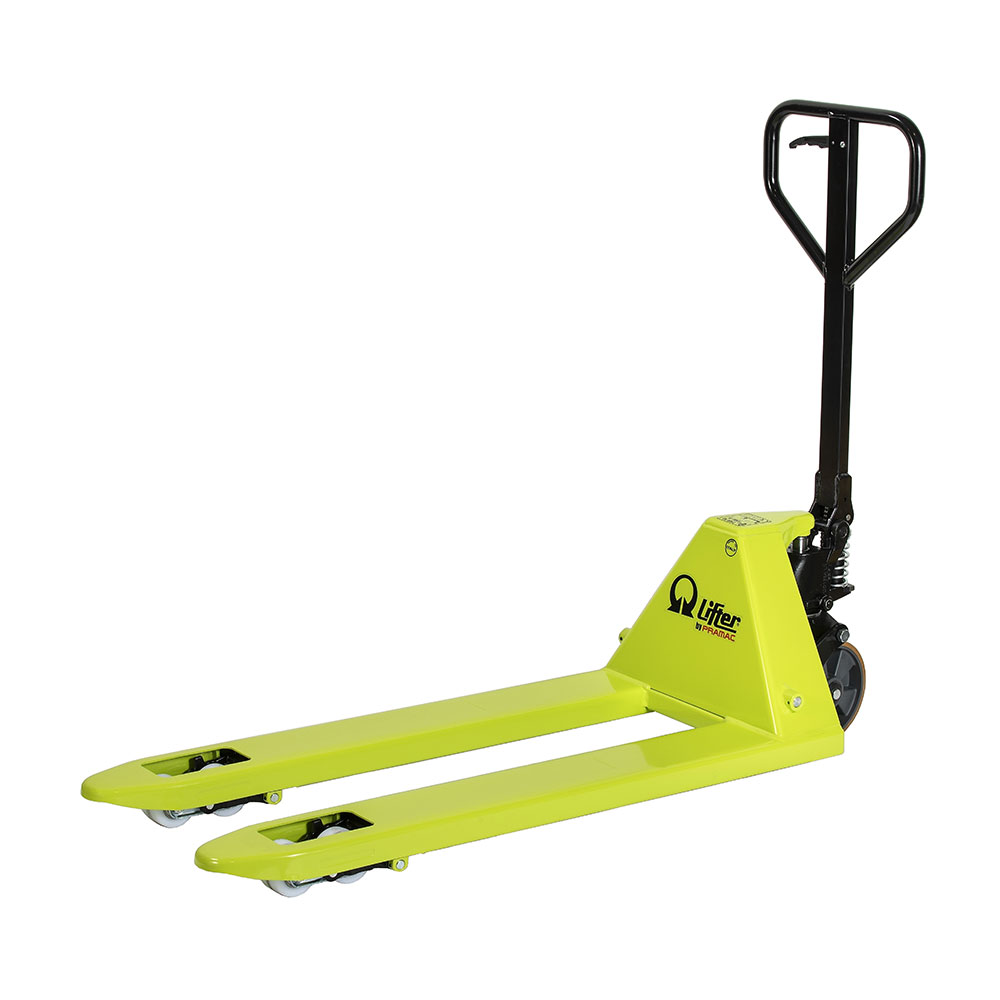Material handling managers have different needs when it comes to pallet trucks. Some managers prefer speed, manoeuvrability, load capacity or ease of use, while others prefer a vehicle option that will outlast the others and potentially save on maintenance or replacement costs.
Fortunately, you have several options when selecting a pallet truck — one of which is whether to use a manual version or an electric powered truck.
What Factors to Consider
Comparing a manual pallet truck with an electric one isn’t always easy. Before deciding which option to use, consider the following factors.
How big is your facility? As a general rule, larger facilities will demand the use of electric pallet trucks. For example, moving pallets manually a long distance throughout a material handling plant or facility can be physically exhausting for a worker. Conversely, in more cramped quarters, an electric pallet truck might not be the best option, as manoeuvring and coming to a complete stop on short notice can be a bit trickier than it is with a manual option.
What are your pallet stacking needs? Electric pallet trucks are usually better designed for easy lifting and moving of tall pallet stacks.
Would you rather save money now or later? Electric pallet trucks are an investment, and one that might not pay off for several years. You must consider personnel costs, the potential costs of complicated maintenance needs, and the cost of damaging a more expensive machine. You also should consider the potential liability of having more electric equipment in your facility.
Manual Pallet Trucks: Pros and Cons
Manual pallet trucks —also called hand pallet trucks —are the most basic type of pallet truck. The standard fork dimensions of a manual pallet truck are 1150x520mm or 1000x680mm.
Standard capacities range from 2,000-2,500kg. The handle is used to pump or hydraulically lift the forks once placed within a pallet, so that pallet laden with product is elevated and transported to its desired destination.
Pros:
Because of the comparatively lower cost, manual pallet trucks are widely used throughout the logistics industry.
Manual pallet trucks are comparatively low maintenance and have no electrical components. A simpler design means that repairs are often quicker than they are with electric pallet trucks, and parts typically are readily accessible.
Hand pallet trucks are known to be reliable and highly durable. Robust, sturdy designs make it easier to maintain over the long term. These pallet trucks are typically able to withstand the rigors of a material handling plant.
By design, manual pallet trucks are able to transport very heavy loads smoothly so that pallets are not damaged En route.
Manual pallet trucks have the benefit of a basic design that enables them to fit many kinds of pallet. They are very versatile, allowing them to be used in operations of any scale. They can also be purchased with varying fork dimensions to better serve in applications that require those dimensions.


Cons:
Manual pallet trucks can put a strain on the user and potentially cause injuries.
By their nature, manual pallet trucks can be more cumbersome to operate.
Due to the limited amount of weight a worker can move on his own, manual pallet trucks are not beneficial if loaded anywhere near its weight capacity. (Note: For safety reasons it is highly recommended that a manual pallet truck never be loaded even close to its capacity.)
Electric Pallet Trucks: Pros and Cons
Electric pallet trucks are completely automated versions of manual pallet trucks. They often are bigger in size, allowing room for the user to stand and ride the pallet truck from pick-up to drop-off.
Pros:
Because they are automated and include power-assisted lifting, electric pallet trucks are less likely to cause a strain-related injury to the user.
Electric pallet trucks can fall under the category of light, medium, or heavy duty. Depending on your application there is an electric pallet truck that will meet your company’s needs.
A complete power system allows electric pallet trucks to lift, lower and move around in a warehouse.
In a busy warehouse setting, electric pallet trucks can save a great deal of operational times, allowing the worker to move greater distances and with fewer breaks.


Cons:
The cost of an electric pallet truck tends to be higher than that of a manual version, although the cost can be recouped over time as electric pallet trucks can increase the overall productivity of a warehouse.
Electric pallet trucks can run into more maintenance issues. With electrical components, things will eventually need to be repaired. And because electric pallets are more complex, maintenance needs can be more involved, expensive, and time-consuming.
As electric pallet trucks are made to carry taller and heavier stacks of pallets, bringing the machine to a complete stop on short notice can be a challenge.
As with any powered equipment in a material handling facility, an electric pallet truck will require additional training for use.
To decide which option is right for a specific type of material handling warehouse plant or facility, consider all of the above factors to identify the best pallet truck solution for your plant application.
Having decided on your best option why not visit our showroom and select a truck?
And remember Kent Pallet Trucks are a leading stockist of pallet trucks and stackers across Kent offering an extensive range and rapid delivery. We also offer service, maintenance and LOLER certification to businesses throughout the region.
